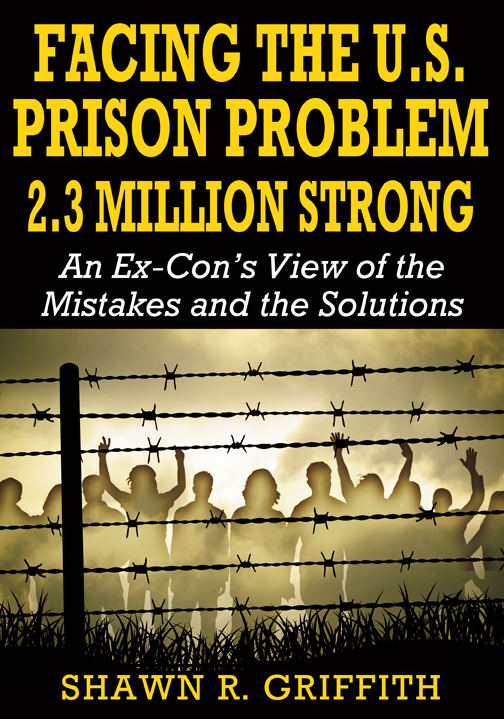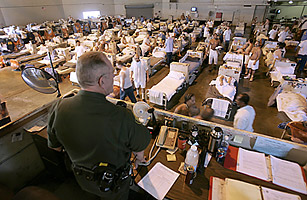Podcast: Play in new window | Download
Updates:
- Michael Ratner: Attends Bradley Manning Hearing
- Psychiatrist Testimony: Manning Not A Suicide Threat
- Rumsfeld Techniques: Stripping, Lights 24 Hours, Sleep Disruption, Solitary
- Manning Testifies About Torture; Was it Aimed at Turning Him on Assange with Michael Ratner
- First Presentation by David Coombs –Manning Attorney with Michael Ratner
- Michael Ratner Discusses Jeremy Hammond Case On “Hactavist Entrapment” RT TV
- Michael Ratner: Manning Describes Cruel and Unusual Punishment; Offers Plea Deal
- Daniel Ellsberg, Michael Ratner and Jessalyn Radack Discuss Bradley Manning Trial: HuffPost
—-
Facing The U.S. Prison Problem 2.3 Million Strong
As many listeners may know the United States has incarcerated more people than any other country in the world, and also within the history of humanity. The newly published book titled Facing The U.S. Prison Problem 2.3 Million Strong by Shawn Griffith gives the reader a rare perspective from an ex convict who served a 20 year sentence in some of the harshest conditions. These include being confined to a small cement cell in the late Florida summer without sheets, laying in pools of sweat on a plastic covered mattress. Vindictive prison guards and case workers in the criminal justice system had made life nearly unbearable for Shawn Griffith. His book hopes to inspire movement building among the families of prisoners to develop a non-profit corporation called the Prisoner Family Union.
- As a youngster, it was a very difficult childhood.
- My parents were very religious, there was a lot of alcohol abuse.
- Early on I went on a truth seeking thing. I also became very rebellious at a young age.
- At 16, I met these people who were crack cocaine addicts. They were the only place I could find to stay off the street. They introduced me to the drug, which I had no knowledge of, how addictive it was.
- Then they told me I had to help them support their habit. They started training me, taking me to homes showing me how to burglarize them, steal cars, a number of things to support our habits.
- When I committed an armed robbery for 100.00 ended up with a 24 year sentenced in which I did 20 years.
- I knew that I had some emotional problems, I started studying psychology for about 4 years. By the age of 23, I attempted to escape initially.
- In Chapter 1, where I explain in detail, some of the sentencing laws that were passed in Florida, those same laws that were passed show decreases in crime rate before the laws were instituted.
- Inmates and their families are by majority below the poverty line. They don’t have a lot of resources to fight back.
- These large groups that influence the correctional system, they are unionized.
- Speakoutpublishing.com
Guest – Shawn Griffith, founder of Speak Out Publishing and has been an institutional teacher of adult basic education for the past sixteen years. He has received many teaching and writing awards from professors and others with whom he has worked, as recently as 2011. He is author of the recently published book Facing The U.S. Prison Problem 2.3 Million Strong
———-
Professor Francis Boyle: Palestine Observer Status
Now that Palestine has been voted in as a new non member state status within the United Nations, Palestinian leaders can join the International Court of Justice and the International Criminal Court and challenge Israel’s violations of international law. We talk with Professor Francis Boyle, the leading expert in international about his role as a Palestine observer. In his book Palestine, Palestinians and International Law, Professor Boyle outlines 6 critical points, among them are:
1. “Palestine can join the Rome Statute for the International Criminal Court and file a Complaint with the ICC against the illegal settlements and settlers, who are committing war crimes;
2. “Palestine can join the Statute for the International Court of Justice, sue Israel at the World Court, and break the illegal siege of Gaza;
3. “Palestine can join the Law of the Sea Convention and get its fair share of the enormous gas fields lying off the coast of Gaza, thus becoming economically self-sufficient;
4. “Palestine can become a High Contracting Party to the Four Geneva Conventions [this deals with the laws of war];
5. “Palestine can join the International Civil Aviation Organization and gain sovereign, legal control over its own airspace;
6. “Palestine can join the International Telecommunications Union and gain sovereign legal control over its own airwaves, phone lines, bandwidths.”
Professor Boyle is the author of many books including Palestine, Palestinians and International Law, The Palestinian Right of Return Under International Law, and United Ireland, Human Rights and International Law.
- The negotiations between Israelis and the Palestinians broke off because Israel continued to build settlements. The Palestinians took the position that well, we’re negotiating over a pizza while you eat it.
- I went back with them with a proposal longstanding with President Arafat, that we apply for membership in the United Nations organization.
- That was approved by the PLO executive committee. The Obama Administration bottled the application up in the UN Security Council.
- The mainstream news media has it wrong, Obama can exercise over their admission if they want to, but under the Uniting For Peace Procedure, they can turn it over to the General Assembly where Palestine can be admitted as a full fledged state by a 2/3 vote.
- They took an intermediate step last Spring, the PLO executive committee that serves as the provisional government for the state of Palestine created by the 1988 Declaration of Independence, voted to apply for UN observer status.
- Look at what Switzerland did from the founding of the United Nations to about 10 years ago as a UN observer state. Palestine can now if it wishes join pretty much every international organization in the world and treaties.
- They can simply use the Swiss model, join the International Criminal Court, join the International Court of Justice, join the Law of the Sea convention, join the International Civic Aviation Convention.
- We already filed a complaint with the ICC after Operation Cast Lead.
- If you follow the Israeli press they’re deathly afraid of prosecution by the ICC.
- The step we saw last week, took two years in the making. The Palestinians had to go all over the world to line up that support.
- It’s been my advice, we go after the settlements now – what they do is up to them (PLO)
- The second legal step is to sue Israel at the International Court of Justice at the Hague. The so called World Court of the United Nations system.
- I’ve offered to do that work for them and try to break that genocidal siege of Gaza.
- You or I aren’t going to decide this.
- We have to stand back and support the Palestinians and let them decide what they’re going to do.
Guest – Professor Francis Boyle, leading American expert in international law. He was responsible for drafting the Biological Weapons Anti-Terrorism Act of 1989, the American implementing legislation for the 1972 Biological Weapons Convention. He served on the Board of Directors of Amnesty International (1988-1992), and represented Bosnia-Herzegovina at the World Court. He served as legal adviser to the Palestinian Delegation to the Middle East peace negotiations from 1991 to 1993.
In 2007, he delivered the Bertrand Russell Peace Lectures. Professor Boyle teaches international law at the University of Illinois, Champaign and is author of, inter alia, The Future of International Law and American Foreign Policy, Foundations of World Order, The Criminality of Nuclear Deterrence, Palestine, Palestinians and International Law, Destroying World Order, Biowarfare and Terrorism, Tackling America’s Toughest Problems, and The Tamil Genocide by Sri Lanka. He holds a Doctor of Law Magna Cum Laude as well as a Ph.D. in Political Science, both from Harvard University.
—————————————————————————-



